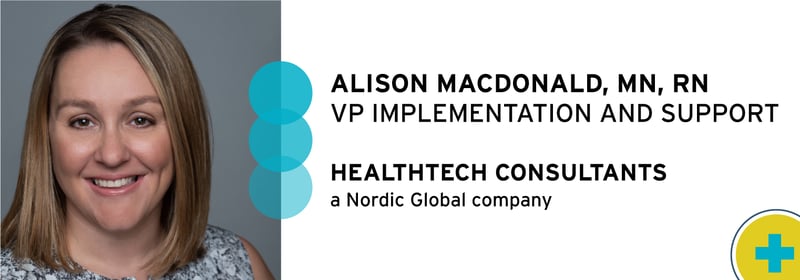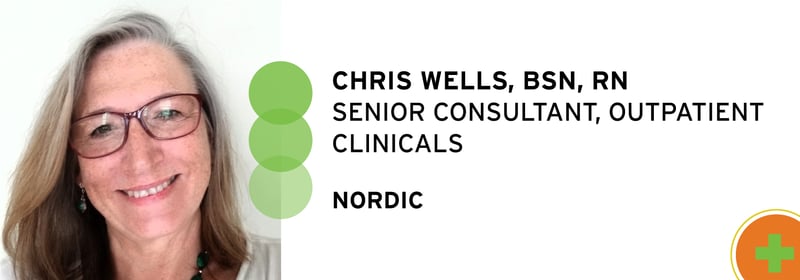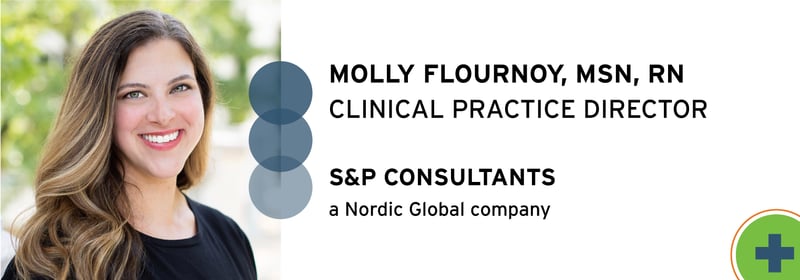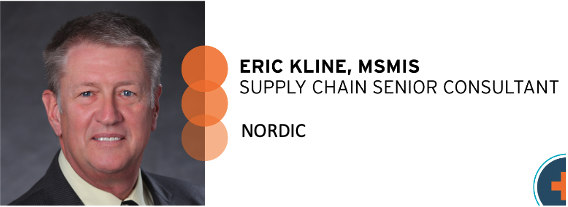Happy International Nurses Day! In celebration and appreciation of the many nurses here at Nordic Global, we have gathered nurses from across the Nordic brands to learn more about their experiences as nurses, and gain insight into how they have translated that knowledge to consulting.
Can you outline your career progression?
I was a practicing RN for about nine years before transitioning to a Central Supply Supervisor. From there I became the Director of Materials Management while working on my master’s degree before joining Lawson as a Supply Chain consultant. Following Lawson, I worked for a couple boutique consulting groups, served on the board of directors for a multiple nursing home organization, and then rejoined the consulting world with ISH. I then found Nordic ERP Services (formerly Bails), but I never really stopped being a nurse.
What brought you to Nordic's ERP Services team?
I knew the personnel from previous employers, and they were all great people. I saw the work they were doing while I was with ISH and wanted join the team.
What trends are you seeing in the market?
Healthcare will continue to be squeezed between payers wanting to reduce revenue, and market forces driving increased cost.
How do these differ from trends/themes you witnessed while you were practicing?
It has been that way for my entire career.
How has your nursing experience brought value to your clients in the consulting part of your career?
As a supply chain consultant in healthcare, I am familiar with the items and how they are used to improve clinical outcomes. It establishes credibility with both the administrative and the clinical staff.

Why did you decide to become a nurse?
I became a nurse because I am a cancer survivor. Through the chemo and surgeries my interest in the medical field was piqued, and there is a lot to be said for the compassionate side of the nursing staff. I was working with the nursing team more than anyone else - they were the ones that basically held my hand throughout the process.
It made sense to me, becoming a nurse. I was in sales before that but didn’t have a passion for it so I got in to nursing for the sole purpose of helping people.
What is/was your favorite thing about being a nurse?
There were many things but primarily, I liked making people better and returning them to their highest level of personal health. I had the opportunity to put a patient in a wheelchair and send them home in a good state. But I also had the opportunity to hold the hands of the survivors and help them grieve.
I liked that I was a respected member of a healthcare team, doctors would ask me questions about patients and truly listen to the responses and take them into account. Doctors aren’t able to be with a patient 24 hours a day, whereas nurses are. Once the physicians got to know you and trust you, they would follow your advice.
What was the most fulfilling project you worked on? Why?
It was completing an assessment of a complete Supply Chain for several hospital organizations. We redesigned their Supply Chain and implemented the solution to drive down healthcare costs.
That being said, let me answer a different question. What is the most fulfilling part of project?
For me, it’s the assessment and design and creating the plan. I get enjoyment out of developing most streamlined process. I like the initiation of a project because you get to meet the people involved, determine the pain points, and understand the personal connection of what they’re trying to do.
I’m technically retired now, but I find fulfillment in mentoring. Mentoring is all about giving back. My knowledge is yours, just ask. I will give you everything I know because I’m not afraid of you as a competitor. You may learn something I tell you and may come up with the next idea to cure cancer or create the next revolutionary software. Who knows? The only way to do that is collaboration.

Can you outline your career progression?
I began my nursing career during the 2003 SARS outbreak and opted for a full-time position as a community-based home care nurse. I fell into informatics while pursuing my master’s in nursing administration at the University of Toronto and working on a project to develop a new clinical documentation system for home care nurses. I was inspired by some excellent leaders at U of T to pursue a full-time position in informatics and ended up leaving my position as an advanced practice nurse in in-home care to join Ontario Shores Centre for Mental Health Sciences as a Clinical Informatics Specialist. Ontario Shores became the first Stage 6 hospital in Canada, and in 2011 I won the Emerging Professional in Health Informatics from Digital Health Canada (formally COACH).
What brought you to Healthtech?
While working on Ontario Shores. Healthtech was our consulting partner and advised us as we embarked on the beta implementation of MEDITECH 6.0 in North America and our journey to EMRAM Stage 6.
I was always interested in consulting and was encouraged by Healthtech’s focus on hiring clinicians, specifically nurses. Working at Healthtech has opened so many career growth opportunities that I would not have experienced if I had stayed in my role at the hospital.
What trends are you seeing in the market?
The COVID-19 pandemic has changed the healthcare landscape. The human resource crisis in healthcare has gone from bad to worse. Specifically, in Canada there is recognition that the lack of investment in modern and integrated digital health systems has put us behind in our ability to respond in a coordinated way to a public health crisis. Lack of skilled healthcare resources is a critical problem and enabling digital health in a meaningful way will help us come up with creative solutions to those problems. Improving our access to data and analytics will allow us understand how to make our healthcare system more efficient while focusing on the improvement of patient outcomes.
How do these differ from trends/themes you witnessed while practicing?
There is a greater recognition of keeping the patient at the center of our digital health innovations. There is an increased focus on the change management requirements for project success.
Do you have any interoperability experience?
My involvement in over a decade worth of health care IT has enabled me to gain a significant understanding of how different systems and tools can communicate. Understanding this has helped to build solutions with clinicians and troubleshoot problems as they arise.

What investments can we make in nursing?
Nurses are the foundation of healthcare. The most significant investment we can make is getting more nurses trained in our colleges and universities. Whenever I am asked about career path recommendations – I always recommend nursing. Nursing is a versatile career with so many opportunities for someone to make a difference.
How has your nursing experience brought value to your clients in the consulting part of your career?
Nursing has provided me with communication skills, relationship-building skills, and the ability to work well under pressure, all of which are critical requirements to be a successful consultant.
The real-life experience I received in both front-line delivery of healthcare and working in administration provides credibility to my clients and shows that I understand the world of healthcare. I can quickly assess and understand clinical requirements, and more efficiently present back in non-technical language solutions to solve the healthcare problems that clients are experiencing.
Why did you decide to become a nurse?
My mom was a nurse, and I thought it was a practical career choice. I want to work with people and am interested in the medical sciences.
What was your favorite thing about being a nurse?
The people - all the coworkers and patients I was able to interact with. I learned so much from them and valued all the human connections I made as a front-line nurse.
What was the most fulfilling project you worked on? Why?
I have been lucky to experience many fulfilling and successful projects. They stand out because of 2 major things:
- The team I worked with: we accomplished big goals but had fun doing it!
- High-quality results: whether we achieved high levels of clinical standardization, improved efficiencies, or just developed an excellent final report.

Can you outline your career progression?
I started out working at 18 as a certified nursing assistant while I worked my way through nursing school. I have been privileged to work in various areas of healthcare from home health to the ED and ICU. Thirteen years ago, I began my Epic journey as an analyst and have loved almost every moment of the transition.
What brought you to Nordic?
I was working with another company and was always impressed with the caliber of talent and experience Nordic consultants brought to the table. When an opportunity came along to join the Nordic team, I was very excited. As a company, I found the culture supportive and the benefits very attractive.
What investments can we make in nursing?
Education reimbursement. Professional development as nurse is directly tied to education levels.
How has your nursing experience brought value to your clients in the consulting part of your career?
Having personal nursing experience and various clinical experiences provided a level of comfort to my customers as they understand that I have a working knowledge of staff roles, patient workflows, and a familiarity with the standards of care for their patients. Having this hands-on experience allows for the development or re-development of existing workflows in an EMR culture with a compassion for the customer’s experience, as well the patients they serve.

Why did you decide to become a nurse?
My response may not be typical. When I was preparing for college and speaking with my guidance counselor about my future goals, I expressed that I wanted to pursue an electrical engineering degree because of my interest in computers at a time when there were no computer science degrees. He discouraged me because it was a ‘mans’ occupation and that I would be confronted with many obstacles if I chose that path. He did mention teaching and nursing as alternate choices, and nursing was something my parents both saw me doing. I went on to nursing school, worked at the bedside for many years, and now ultimately ended up working with computers and configuring programs.
What is/was your favorite thing about being a nurse?
I enjoy helping others. Being a nurse is the amplification of compassion, caring, troubleshooting, analyzing, and acting on the analysis of the information gathered while providing care to others.
What was the most fulfilling project you worked on? Why?
Optimization projects have been the most rewarding. Stepping into an established EMR and making tools and workflows available to end users that are safe, efficient, and intuitive while increasing end user satisfaction is very satisfying. Hearing the gratitude from the customers and “thank you, this is so much better” makes all the work worth it.

Can you outline your career progression?
I started as an ED/Trauma RN in 2010 then moved to consulting in 2013 as a Clinical Strategist. In 2017 I was hired by S&P as a Clinical Strategist. From there, I obtained a Master’s of Science in Nursing – Executive Nursing in 2020 and was promoted to Clinical Practice Director in 2021.
What brought you to S&P?
I appreciated that the team was predominately clinicians and had a similar passion for designing an EHR that would allow clinicians to work smarter, not harder, for their patients.
What trends are you seeing in the market?
The need to revamp and optimize EHRs. Many facilities went live in the early 2000’s and have not had much standardization or governance over their domain since. We have a knack for seeing how to optimize and maximize clinician’s experiences while also maintaining an integrated workflow with revenue cycle.
How do these differ from trends you witnessed while you were practicing?
EHRs were still relatively immature while I was practicing. There are way more exciting ways to interact with the software now!

What investments can we make in nursing?
I think it is important to invest time and knowledge into nurses. Nursing is an amazing vessel into so many options within healthcare. I never learned about the world of informatics, or even healthcare IT, until I was a burnt-out night shift nurse looking for another way to use my clinical decision making. I wish someone had shared all the doors a nursing degree could open with me sooner!
Why did you decide to become a nurse?
I decided to become a nurse because I naturally had a heart of service, but I also loved the challenge of how intricate and integrated people’s health becomes. It is not a straightforward answer for everyone, and you have a lot to consider when treating a patient. I also knew I would continue to learn something new, which excited me.
What is/was your favorite thing about being a nurse?
My favorite thing about being a nurse is that I am a part of the solution.
What was the most fulfilling project you worked on? Why?
All projects have been fulfilling in different ways. I know that is kind of a cop-out, but true. They have all been fulfilling because we have left the client with a sustainable, easier-to-use EHR that allows clinicians to maintain their focus on patient care while also generating revenue for the facility. It’s a win-win!
